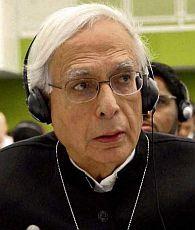 Vidya Charan Shukla, a former Union minister and Congress veteran from Chhattisgarh, died on Tuesday in a Gurgaon hospital after battling injuries sustained in a deadly Naxal attack on a convoy of party leaders in Chhattisgarh's restive Bastar district a fortnight ago.
Vidya Charan Shukla, a former Union minister and Congress veteran from Chhattisgarh, died on Tuesday in a Gurgaon hospital after battling injuries sustained in a deadly Naxal attack on a convoy of party leaders in Chhattisgarh's restive Bastar district a fortnight ago.
A Congressman by origin who changed parties and held key portfolios including external affairs, Shukla achieved fame during the infamous Emergency as a propagandist for Indira Gandhi's government.
Son of illustrious Congressman and freedom fighter Pandit Ravishankar Shukla, the first chief minister of the re-organised Madhya Pradesh, V C Shukla entered Lok Sabha from Mahasamund after winning in the second general elections in 1957 as one of the youngest Parliamentarians.
His brother Shyama Charan Shukla was a veteran Congressman, who had served as chief minister of an undivided Madhya Pradesh.
He won nine Parliament elections and in his long political career, he held virtually all portfolios including communications, home affairs, defence, finance, planning, civil supplies, external affairs, parliamentary affairs and water resources at the centre.
But his role as information and broadcasting minister during the Emergency catapulted him to national focus and also got him some odium.
Shukla stood by his decisions and admitted to taking them before a commission of inquiry set by the then Janata Party government.
During the Emergency, he banned songs of Kishore Kumar from All India Radio and Doordarshan, because the singer once refused to perform at an Indian National Congress rally in Mumbai.
His ministry also attracted adverse attention for its severe media censor policy during a period when freedom of speech was under attack.
Shukla graduated from Morris College Nagpur in 1951 and started Allwyn Cooper Private Ltd, which organised big-game safari and photo expeditions of wildlife in central Indian forests, in addition to Manganese and Dolomite mining.
He joined the revolt against Rajiv Gandhi in the mid 1980s and was one of the founders of Jan Morcha headed by V P Singh.
Later, he became a minister in the National Front government of 1989-90 under V P Singh and switched allegiance to join the subsequent Chandrasekhar government to become the external affairs minister.
Then he returned to Congress and became a minister in the P V Narasimha Rao government. Later, he enjoyed a brief stint with the Bharatiya Janata Party before returning to the Congress.











 © 2025
© 2025